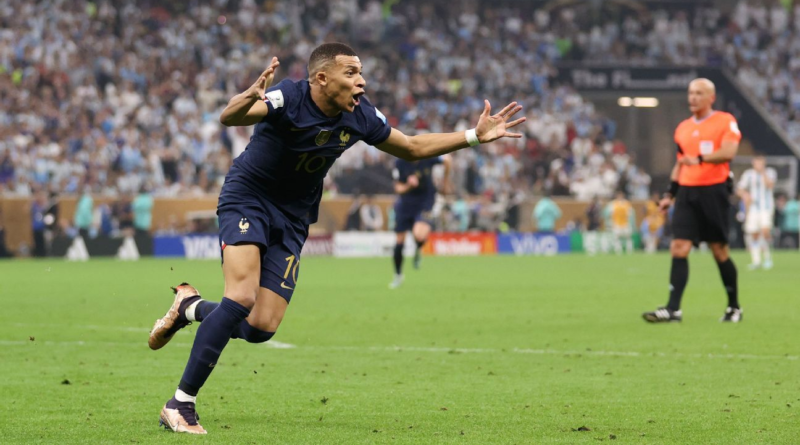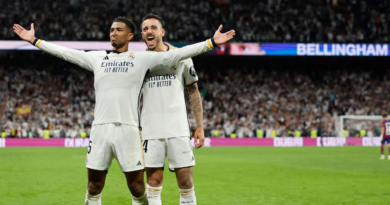Way-too-early look at 2026 World Cup: Expect France to win, US to make a deep run
The 2022 World Cup is over. The stars have shone, the shock results have shown that football is truly a global game, some new names have emerged and, at the end of it all, Argentina lifted their third World Cup (though really, the story is Lionel Messi winning his first at the fifth attempt in a glittering career).
But with Qatar 2022 now consigned to history, and just 3½ years to go until the next World Cup is staged in the United States, Mexico and Canada, it’s time to look ahead to how that tournament will play out with some way-too-early predictions for 2026.
– World Cup 2022: News and features | Bracket | Results
P.S.: If you think it is too soon, why not check out our way-too-early predictions for 2022 from four years ago?
No big nations will miss out
Every World Cup takes place with at least one heavyweight nation having failed to qualify: Italy have missed out in 2018 and 2022, while Colombia, Chile and Egypt were also absent from Qatar 2022. But with the 2026 World Cup expanding from 32 to 48 competing nations, it will become harder to miss out than actually qualify for most powerhouse teams.
– What the World Cup will look like in 2026
Europe will get three extra spots and South America another two, with an extra four places each for Asia and Africa. Hosts USA, Mexico and Canada will qualify automatically, but there will still be another three qualifiers from CONCACAF, meaning it would take a really bad qualification campaign to miss out in 2026.
Get ready for some big scorelines
The downside of an expanded World Cup will be a greater gulf in quality between the top teams and those who only make it by virtue of the additional qualification places.
Japan beat Germany and Spain in Qatar, while Morocco upset Belgium, Spain and Portugal on the way to become Africa’s first-ever semifinalists. But will the eighth-best team in Africa or Asia — right now, that would be Mali or the United Arab Emirates — really be competitive in 2026? Will New Zealand finally win a game at a World Cup — Oceania gets one guaranteed qualification spot — after returning winless from two previous tournaments?
Bigger World Cups mean greater opportunities for nations to qualify, but when they get there, it could be a pretty steep learning curve against the top teams.
Get ready for Haaland v. Mbappe
There will be no Messi vs. Cristiano Ronaldo in 2026, but get ready for Erling Haaland to challenge Kylian Mbappe for the status as football’s biggest superstar.
Norway have not qualified for the World Cup since 1998, but with Manchester City forward Haaland and Arsenal captain Martin Odegaard now leading the team, it’s difficult to imagine they won’t make it in 2026. France forward Mbappe already has two glittering World Cup tournaments to his name from 2018 and 2022, but Haaland is the one player right now who can challenge him for the billing as football’s most exciting star.
The 2026 World Cup needs Haaland, and he is such a potent goal scorer that Norway should be able to claim one of Europe’s 16 qualification spots to ensure he plays on football’s biggest stage.
More tears for Neymar and Brazil
No player is under more pressure to deliver at a World Cup than Neymar, but in 2014, 2018 and 2022, injuries would deny the Brazil forward the chance to fulfil his role as the nation’s talisman.
The Paris Saint-Germain player moved level with Pele on 77 goals as Brazil’s all-time top goal scorer during Qatar 2022, so his contribution on the pitch for the country cannot be questioned. But World Cups have been cruel to Neymar, and he will be 34 by the time the next one starts. Can he really lead Brazil to glory in 2026?
Brazil ended a 24-year wait to be world champions again at USA 94, so they will hope that they can bridge the same gap in 2026, having last won it in 2002. But with age catching up with Neymar, and key players like Thiago Silva, Dani Alves and Casemiro all unlikely to be around in 2026, World Cup glory seems a distant dream for this Selecao generation.
1:31
Taylor Twellman lays into Brazil’s “inexcusable” defeat to Croatia in the quarter-finals of the 2022 FIFA World Cup.
US to exceed expectations
The United States have plenty to be optimistic about going into 2026 and the tournament can become the USMNT’s best in modern times.
Yes, they have issues to overcome. Like many teams, they don’t yet have a proven goal scorer to win the tightest of games, and there are valid question marks over coach Gregg Berhalter’s ability to take the squad to the next level. But the US has a young and talented squad, including players performing regularly in the UEFA Champions League and Europe’s top leagues.
Christian Pulisic, Tyler Adams, Weston McKennie, Yunus Musah, Timothy Weah and Giovanni Reyna will all be at, or approaching, their peak in 2026, so the future is bright. With home support and a favourable draw, the USA can go beyond the quarterfinals — a stage they last reached in 2002 — and really go deep in 2026.
No Kane, no glory for England
England will endure more World Cup disappointment in 2026, with or without Harry Kane. If the Tottenham forward is still in the team by the time the tournament starts — he will be 33 in July 2026 — that will be a big problem for England, because Kane’s goal threat has already started to diminish.
Since losing to Italy in the Euro 2020 final in July 2021, Kane has scored 15 goals for England, but seven have been penalties, including two of the four goals he scored in a 10-0 win against San Marino in November 2021. He is dropping deeper to find the ball and no longer offers the kind of focal point that Olivier Giroud so successfully provides for France.
Yet without Kane, England don’t have a reliable goal scorer, and there isn’t an obvious successor emerging down the line. So unless England find a new striker, football won’t be coming home. Again.
1:05
Steve McManaman praises England’s performance despite losing 2-1 to France at the 2022 FIFA World Cup.
Germany, Spain and Italy bounce back
Germany, Spain and Italy have won nine World Cups between them, but Qatar 2022 was a tournament to forget for all of them. Italy, Euro 2020 winners, didn’t even qualify, while Germany crashed out at the group stage for the second successive tournament, and Spain were eliminated on penalties after a 0-0 draw against Morocco in the round of 16.
Germany coach Hansi Flick has already spoken of big changes, and you can bet that the 2014 World Cup winners will be strong and competitive in 2026, led by the dazzling talent of Jamal Musiala. Spain also have too much talent to be down for long, with Gavi, Pedri, Nico Williams and Dani Olmo all set to form the backbone of the new team even though manager Luis Enrique won’t be there, having stepped down in the wake of La Roja exiting the tournament.
As for Italy, after missing out on two successive World Cups, will not fail for a third time. It’s time for Italy to bounce back, and they will.
A World Cup with a bigger, better all-seeing VAR
The 2026 World Cup could see artificial intelligence make VAR a flawless concept that eradicates all debate over refereeing decisions.
Is it a leap too far? Maybe, but VAR has developed rapidly since first being introduced at FIFA tournaments during the 2017 Confederations Cup in Russia. In Qatar, we had semi-automated offside which worked successfully and it is inevitable that more new technology will emerge between now and 2026 that will take VAR and off-field decisions to a new level.
Who will be the young stars to watch out for?
England’s Jude Bellingham, Germany midfielder Musiala and Spain’s Gavi and Pedri have already announced themselves on the world stage at Qatar 2022. What those young stars who didn’t play in this World Cup, but could be stars in 2026?
Keep an eye on Benjamin Sesko, the Slovenia forward, who has emerged as one of Europe’s hottest young talents with FC Salzburg. And while Brazilian forward Endrick is just 16 years old, his recent move to Real Madrid suggests that he could be a big part of Brazil’s plans in 2026, when he will be 19 at the start of the tournament.
Manchester United‘s Alejandro Garnacho, now 18, will surely be a big part of Argentina’s plans in 2026, while Florian Wirtz and Youssoufa Moukoko are likely to be established names in the Germany squad by the time the next World Cup rolls around.
Manchester City’s Cole Palmer is another youngster who will be eyeing up 2026 with the England national team.
Who will win the awards?
The race for the Golden Boot will be between Kylian Mbappe and Erling Haaland. Argentina’s Julian Alvarez will be in the conversation, but without Messi creating chances, the Manchester City forward will miss out. If Norway qualify, Haaland will win the Golden Boot.
The Golden Glove goes to the goalkeeper who concedes the fewest goals, so after tipping Italy’s Gianluigi Donnarumma four years ago to win it in Qatar 2022, it’s only fair to back the Paris Saint-Germain keeper to finally get his hands on it in 2026.
The best young player will be the aforementioned Musiala. By 2026, he will be 23 and almost certainly the driving force for Germany’s hopes.
Biggest surprise in the tournament? Aside from the US potentially reaching the semis, let’s go for Mexico because the advantage of playing in Mexico City, Monterrey, and Guadalajara will be huge for El Tri. They will also be desperate to bounce back from a group stage exit in Qatar. They have the players and the supporters, so Mexico can go a long way in 2026.
So who will win the 2026 World Cup?
France. If in doubt, back France. Mbappe will be just 25 when the next World Cup comes around, and he will be supported by what appears to be an endless supply of new talent from within the French system. But Germany and Italy will also be competitive in 2026.



